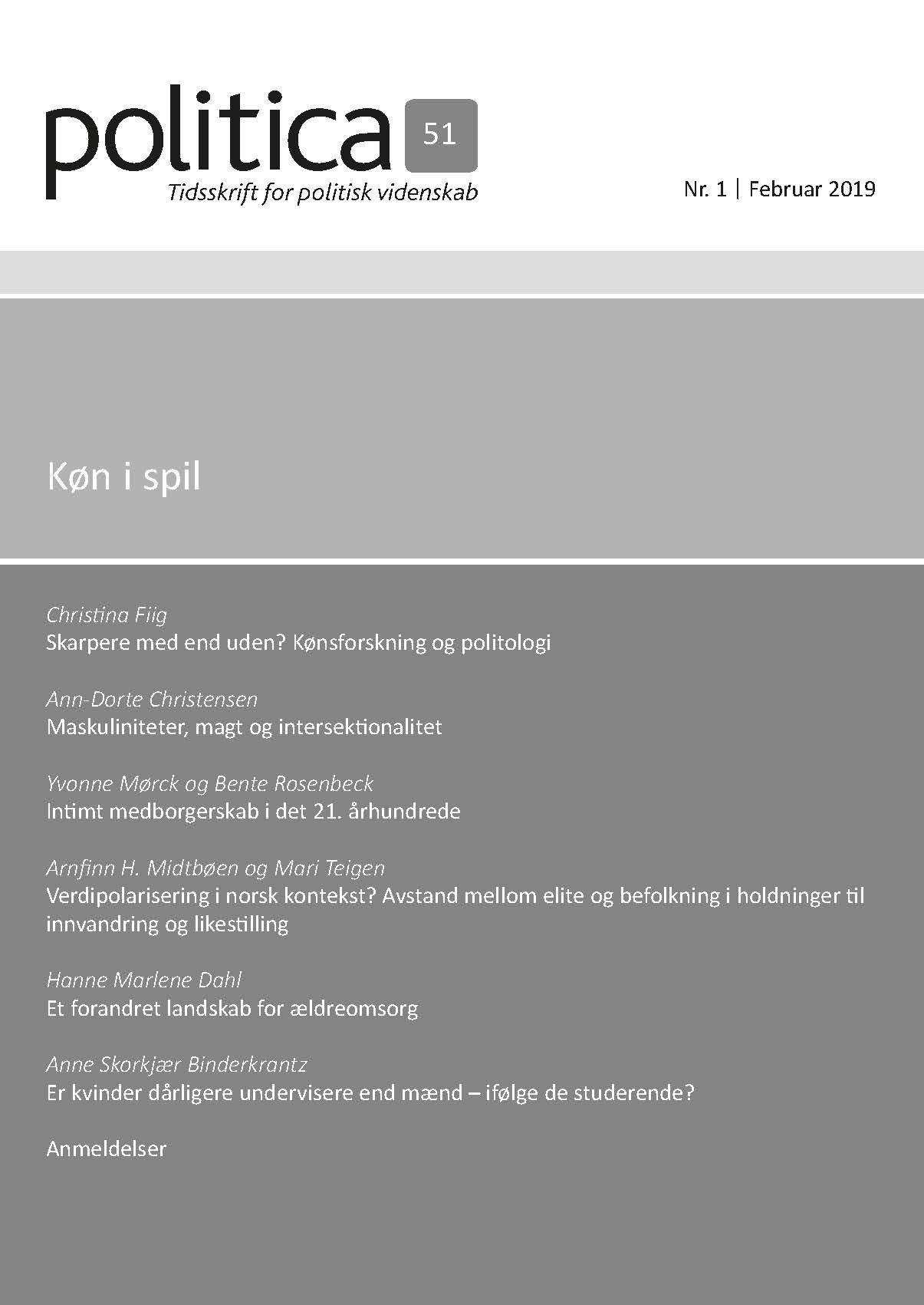Er kvinder dårligere undervisere end mænd – ifølge de studerende?
DOI:
https://doi.org/10.7146/politica.v51i1.131113Abstract
En række internationale studier har vist, at kvindelige undervisere får dårligere evalueringer end deres mandlige kolleger. Artiklen undersøger, om det også er tilfældet i en dansk kontekst. Artiklens analyser bygger på evalueringer foretaget på Aarhus BSS, hvor et fælles evalueringsskema bruges på tværs af uddannelser, der varierer ganske meget i forhold til kønssammensætningen af både studerende og undervisere. Artiklen inddrager næsten 40.000 evalueringer af mere end 1.000 forskellige undervisere. På den baggrund vises, at der snarere end en helt generel bias i evalueringer ser ud til at være en sammenhæng mellem sammensætningen af undervisergruppen, den studerendes køn og vurderingen af undervisere af forskelligt køn.
References
Arbuckle, Julianne og Benne D. Williams (2003). Students’ perceptions of expressiveness: Age and gender effects on teacher evaluations. Sex Roles 49 (9/10): 507-516.
Bandura, Albert (1997). The Exercise of Control. New York: W.H. Freeman and Company.
Basow, Susan A. (2000). Best and worst professors: Gender patterns in students’ choices. Sex Roles 43 (5/6): 407.
Boring, Anne (2017). Gender biases in student evaluations of teaching. Journal of Public Economics 145: 27-41.
Boring, Anne, Kellie Ottoboni og Philip B. Stark (2016). Student evaluations of teaching (mostly) do not measure teaching effectiveness. ScienceOpen Research.
Braga, Michela, Marco Paccagnella og Michele Pellizzari (2014). Evaluating students’ evaluations of professors. Economics of Education Review 41: 71-88.
Burns-Glover, Alyson L. og Dale Veith (1995). Revisiting gender and teaching evaluations: Sex still makes a difference. Journal of Social Behavior and Personality 10 (4): 69.
Centra, John A. og Noreen B. Gaubatz (2000). Is there gender bias in student evaluations of teaching? The Journal of Higher Education 71 (1): 17-33.
Dalsgaard, Peter, Mikkel Bille, Rasmus Bjørk, Steffen Dalsgaard, Henrik Dimke, Karen Gram-Skjoldager og Nikolaj Zinner (2017). Https://www.altinget.dk/forskning/artikel/undervisere-her-er-de-fem-stoerste-problemer-med-studenterevalueringer (12. januar 2018).
Feldman, Kenneth A. (1992). College students’ views of male and female college teachers: Part I: Evidence from the Social Laboratory and Experiments. Research in Higher Education 33 (3): 317-375.
Feldman, Kenneth A. (1993). College students’ views of male and female college teachers: Part II: Evidence from students’ evaluations of their classroom teachers. Research in Higher Education 34 (2): 151-211.
Fiig, Christina (2019). Skarpere med end uden? Kønsforskning og politologi. Politica 51 (1): 5-18.
Jaschik, Scott (2015). Rate my word choice. Inside Higher Education.
Kantola, Johanna (2008). “Why do all the women disappear?” Gendering processes in a political science department. Gender, Work and Organization 15 (2): 202-225.
Laird, Thomas F.N., Amy K. Garver og Amanda S. Niskode-Disset (2011). Gender gaps in collegiate teaching style: Variations by course characteristics. Research in Higher Education 52: 261-277.
Laube, Heather, Kelley Massoni, Joey Sprague og Abby L. Ferber (2007). The impact of gender on the evaluation of teaching: What we know and what we can do. NWSA Journal 19 (3): 87-104.
Macnell, Lillian, Adam Driscoll og Andrea N. Hunt (2015). What’s in a name? Exposing gender bias in student ratings of teaching. Innovative Higher Education 40 (4): 291-303.
Martin, Lisa L. (2016). Gender, teaching evaluations, and professional success in political science. PS: Political Science & Politics 49 (2): 313-319.
Mengel, Frederikke, Jan Sauermann og Ulf Zölitz (2017). Gender bias in teaching evaluations. Journal of the European Economic Association.
Nielsen, Mathias Wullum (2017a). Scandinavian approaches to gender equality in academia: A comparative study. Scandinavian Journal of Educational Research 61 (3): 295-318.
Nielsen, Mathias Wullum (2017b). Reasons for leaving the academy: A case study on the “opt out” phenomenon among younger female researchers. Gender, Work and Organization 24 (2): 134-155.
Regeringen (2018). Fleksible universitetsuddannelser til fremtiden.
Rudman, Laurie A. og Peter Glick (2001). Prescriptive gender stereotypes and backlash toward agentic women. Journal of Social Issues 57 (4).
Sinclair, Lisa og Ziva Kunda (2000). Motivated stereotyping of women: She’s fine if she praised me but incompetent if she criticized me. Pers Soc Psychol Bull 26 (11): 1329-1342.
Sprague, Joey og Kelley Massoni (2005). Student evaluations and gendered expectations: What we can’t count can hurt us. Sex Roles 53 (11/12): 779-793.
Stes, Ann, Vincent Donche og Peter V. Petegem (2004). Understanding differences in teaching approaches in higher education: An evidence-based perspective. Reflective Education 9 (1): 21-35.
Uttl, Bob, Carmela A. White og Daniela Wong Gonzalez. (2017). Meta-analysis of faculty’s teaching effectiveness: Student evaluation of teaching ratings and student learning are not related. Studies in Educational Evaluation 54: 22-42.
Wright, Stephan L. og Michael A. Jenkins-Guarnieri (2011). Student evaluations of teaching: combining the meta-analyses and demonstrating further evidence for effective use. Assessment & Evaluation in Higher Education 37(6): 683-699.
Aarhus BSS (2016a). Kønsbalance jan-juni 2016. Aarhus: Aarhus BSS
Aarhus BSS (2016b). Procedure til evaluering af kursusforløb på Aarhus BSS. Aarhus: Aarhus BSS
Aarhus Universitet (2016). Optagelsesstatistik 2016. Aarhus: Aarhus Universitet (Uddannelsesstrategisk sekretariat).
Aarhus Universitet (2017). Aggregerede studieledertal efteråret 2017. Aarhus: Aarhus Universitet





